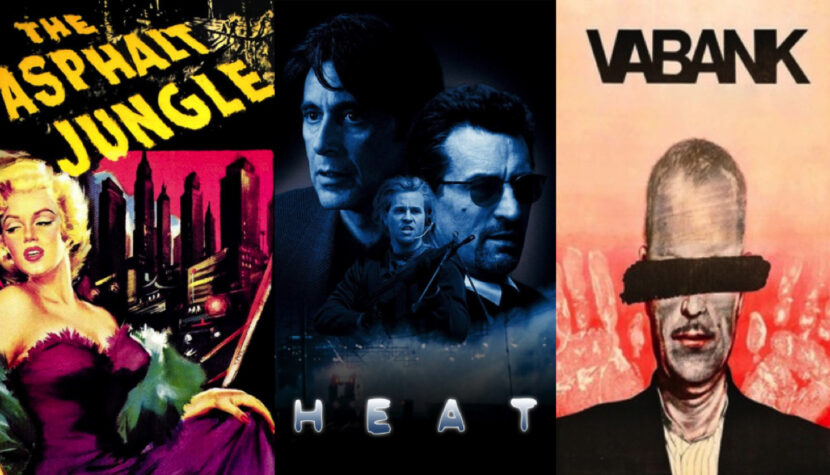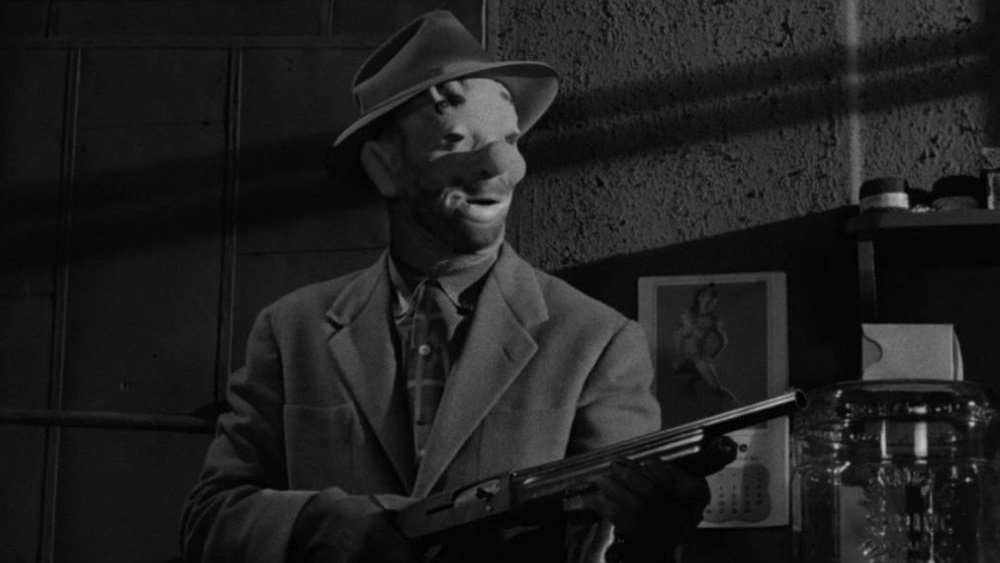Everybody Be Cool This Is A Robbery! 10 Best Heist Films

The term ‘heist film’ simply refers to a film about armed robbery, daring theft, a bank or casino heist, or other crimes targeting places full of money and valuables. While there are exceptions to this rule, a typical heist film not only depicts the execution of the heist itself but also the preparation for the criminal endeavor and its consequences – and it does so from the perspective of the criminals rather than law enforcement. Here’s a subjective list of ten best films of this kind.
Asphalt Jungle (1950)

While elements of heists had appeared in cinema earlier [such as The Great Train Robbery (1903) by Edwin S. Porter, The Killers (1946), and Criss Cross (1949) by Robert Siodmak], most film historians consider the production of Asphalt Jungle as the seminal work of this genre (related to the aesthetics of film noir). John Huston’s celebrated film starring Sterling Hayden and a young Marilyn Monroe contains everything typically associated with heist films: meticulous planning of the heist, assembling a team of specialized members, and finally, the heist itself at a jewelry store and its lamentable consequences. The prestigious success of the film (four Oscar nominations) initiated a true wave of heist films not only in the USA: Armored Car Robbery (1950) directed by Richard Fleischer, Rififi (1955) by Jules Dassin, and 5 Against the House (1955) by Phil Karlson are just three examples indebted to Huston.
The Killing (1956)

The Killing (1956) may stand in the shadow of more famous Stanley Kubrick films such as 2001: A Space Odyssey (1968), A Clockwork Orange (1971), and The Shining (1980). Unjustly so, because although the studio-forced narrative from off-screen may be irritating, and the low budget didn’t allow for full development of its potential, the adaptation of Lionel White’s novel Clean Break remains intriguing. Perhaps it’s because the story of what seems like a successful but ultimately disastrous heist at a horse racing track served as Kubrick’s starting point for a commentary on human nature. And since he was a misanthrope, it’s not hard to imagine the colors this portrait took. Dark sides of humanity, the conflict of the individual with society, stupidity, greed – it’s all there, the elements for which Kubrick’s films are renowned, serving as inspiration for generations of filmmakers to this day.
Ocean’s Eleven (1960)

Heist films with a comedic twist had been produced earlier as well – including The Lavender Hill Mob (1955) by Charles Crichton, The Ladykillers (1955) by Alexander Mackendrick, and Big Deal on Madonna Street (1958) by Mario Monicelli – with one exemplary instance being Lewis Milestone’s star-studded film featuring Frank Sinatra, Dean Martin, Sammy Davis Jr., Peter Lawford, and Joey Bishop. The plot of Ocean’s Eleven revolves around World War II veterans planning to rob five of the biggest casinos in Las Vegas in a single night. Despite the accumulation of well-known names and fast-paced action, Ocean’s Eleven received mixed reactions. In 2001, Steven Soderbergh directed a remake titled Ocean’s Eleven, which spawned two sequels and one spin-off. A prequel is also reportedly in the works.
The Italian Job (1969)

This witty and unpretentious heist film is one of the gems in the crown of British cinema. Flawless casting (Michael Caine, Noël Coward, Benny Hill), skillful direction (Peter Collinson), and intelligent writing (Troy Kennedy Martin) came together to create an explosive mixture that maintains the perfect balance between action and comedy. A group of robbers plans to heist a convoy transporting gold bars worth $4 million. The precious cargo arrives in Italy straight from China, serving as payment for a car factory that Fiat sells to Chinese entrepreneurs. It sounds unlikely, and indeed it is, but realism is not the focus here; it’s all about having a good time – and The Italian Job delivers that in abundance. One of the most memorable scenes in the film is the Mini Cooper chase through Turin. In 2003, F. Gary Gray directed a remake that pales in comparison to the original.
Le Cercle Rouge / The Red Circle (1970)

Jean-Pierre Melville’s penultimate work starring Alain Delon, Yves Montand, and André Bourvil is considered a masterpiece in its slow-building tension. This atmospheric film tells the story of three men who carry out a heist on a jewelry store in Paris. The sequence of the heist, paying homage to Rififi, is almost entirely devoid of dialogue and takes up 30 out of the film’s 140 minutes. The criminal plot serves as a pretext for a philosophical discourse on friendship, honor, loyalty, and destiny; not without reason, the film opens with a quote attributed to Buddha, invented by Melville: “At a certain day and hour, unknown to them, whatever they were doing, they meet inside the red circle drawn by Buddha, to live or to die within it.” Today, it’s easy to recognize the influence that Le Cercle Rouge had on the work of filmmakers such as John Woo and Michael Mann.
Vabank (1981)

Juliusz Machulski’s feature film debut is included here not out of sentimentality, but because it is truly an outstanding film that holds its ground against foreign productions of its kind. Vabank is, in fact, a clear pastiche of The Sting (1973) by George Roy Hill, although the prototype for Henryk Kwinto was Stanisław “Szpicbródka” Cichocki – the most famous thief of the Second Polish Republic, who even received his own film, Hello, Szpicbródka, or the Last Performance of the King of Thieves (1978) by Janusz Rzeszewski and Mieczysław Jahoda. The main plot of Vabank revolves around Kwinto’s revenge on his former partner Kramer, with its climax being the ingenious, playful bank heist. The film was a great success both in terms of attendance and commercially, and critics also praised it. It is now an undisputed classic of Polish cinema.
Heat (1995)

Michael Mann delved into organized crime as early as his brilliant debut Thief (1981), but it is Heat that stands as the most comprehensive, multi-layered, and realistic portrayal of the underworld not only in the director’s filmography but also in the history of cinema. The story of the relentless thief Neil McCauley (superbly restrained Robert De Niro) and the pursuing detective Vincent Hanna (excellently expressive Al Pacino) is more than just a perfect action film: it is a parable about the consequences of choices made, about loyalty to principles, about the role of chance in the lives of complex, fully realized characters. Naturally, there are flawlessly executed heist scenes here (such as the van action and the bank robbery). Heat is not only the best film on this list – it is a masterpiece of cinema. Not of gangster cinema, not of heist films, but of cinema itself.
Jackie Brown (1997)

Most cinephiles would probably include Reservoir Dogs (1992) here, but the undersigned, for many reasons, prefers Quentin Tarantino’s later film. Much like Heat, the heist element in Jackie Brown serves as a springboard for a completely different kind of contemplation. Drawing from the literature of Elmore Leonard, Tarantino infused the film with reflections on aging, succumbing to evil, wasted lives, unexpected chances from fickle fate, and even late, platonic love between two mature individuals with baggage. The creator of brutal fantasies like Pulp Fiction was never as lyrical and melancholic before or since. But fear not – Jackie Brown is not a bleak psychodrama, but rather a gangster comedy-drama with a complex plot where the stakes are half a million dollars. An excellent blend of entertainment and spiritual nourishment.
Lock, Stock and Two Smoking Barrels (1998)

It’s hard to imagine a similar compilation without one of Guy Ritchie’s films. The choice fell on Lock, Stock and Two Smoking Barrels, although the equally crazy Snatch (2000) could just as easily have been included. The plot seems simple: a young card player loses half a million pounds in a rigged game with the local mafia boss. With only a week to repay the debt, the gambler and his friends decide to rob the neighbors living next door, who are planning to rob marijuana dealers. Everything gets complicated due to a series of coincidences, intertwining the fates of the card player and his friends with a gallery of colorful characters like Harry “The Hatchet” and “Big Chris.” The story is precisely constructed, the pace never slows down for a moment, the script sparkles with witty dialogues, and the soundtrack is filled with perfectly chosen music (The Stooges!). A cult film in every sense of the word.
Sexy Beast (2000)

The compilation of the best heist films is completed by Jonathan Glazer’s full-length debut, whose latest film The Zone of Interest is competing in this year’s Oscar race. Sexy Beast is not purely a genre film: although the bank heist scene, impressive and suspenseful as it is, lasts only a few minutes. The rest is an electrifying mixture of black humor, perverse romance, and violent action (both physical and verbal). It’s more of a psychological film about the nature of gangsters than a gangster film strictly speaking; at times the tension is almost unbearable, thanks not only to the excellently crafted screenplay but also to the performances of the main cast, especially Ben Kingsley, who as the psychopath Don Logan created one of the greatest performances of his career. Equally impressive is Ray Winstone as the retired gangster forced into one last job.
Supplement
Rififi (1955) by Jules Dassin, The Pink Panther (1963) by Blake Edwards, Band of Outsiders (1964) by Jean-Luc Godard, Gambit (1966) by Ronald Neame, The Thomas Crown Affair (1968) by Norman Jewison, The Getaway (1972) by Sam Peckinpah, Thief (1981) by Michael Mann, City on Fire (1987) by Ringo Lam, The Usual Suspects (1995) by Bryan Singer, and Ronin (1998) by John Frankenheimer.

